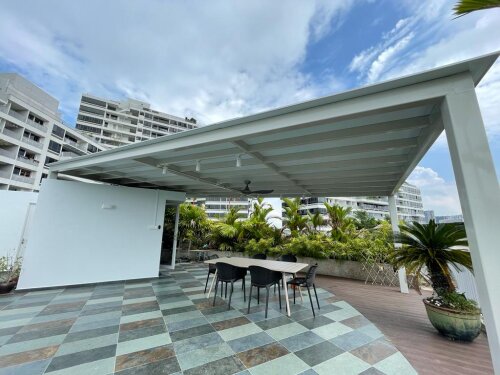Best Energy Regulatory Law Lawyers in City Hall
Share your needs with us, get contacted by law firms.
Free. Takes 2 min.
List of the best lawyers in City Hall, Singapore
About Energy Regulatory Law in City Hall, Singapore
Energy Regulatory Law in City Hall, Singapore refers to the system of statutory and administrative rules that govern the generation, distribution, and consumption of energy within the city. The legal framework is designed to ensure a stable, reliable, and affordable supply of electricity and gas, while promoting competition, protecting consumers, and meeting environmental objectives. Given Singapore's status as an urban and commercial hub, significant emphasis is placed on energy efficiency, sustainable practices, and transparent regulatory oversight. Entities involved in the energy sector must comply with a range of laws and regulations administered at both national and municipal levels, including those directly overseen by City Hall authorities.
Why You May Need a Lawyer
Legal guidance in the area of Energy Regulatory Law can be essential for a wide variety of individuals and organizations in City Hall, Singapore. Common situations where legal help is needed include:
- Seeking licenses or permits for electricity or gas supply or distribution
- Complying with regulatory changes or reporting duties mandated by governmental authorities
- Negotiating or drafting energy supply contracts and agreements
- Energy infrastructure development, investments, or joint ventures
- Dealing with allegations of non-compliance, investigations, or enforcement actions
- Resolving disputes between energy providers, consumers, or government bodies
- Meeting renewable energy targets or navigating incentives for clean energy projects
- Understanding obligations under schemes such as carbon tax or energy efficiency requirements
A specialist lawyer can provide valuable assistance by ensuring regulatory compliance, minimizing risks, offering strategic advice, and representing your interests in negotiations or legal proceedings.
Local Laws Overview
In City Hall, Singapore, key legislation and regulations pertaining to Energy Regulatory Law include the Electricity Act, Gas Act, Energy Conservation Act, and related subsidiary legislations. The Energy Market Authority (EMA) is the central regulatory body that oversees electricity and gas sectors, while City Hall municipal authorities may implement specific local schemes or requirements.
- Licensing: All electricity and gas market activities require licensing from the EMA.
- Competition: The legislation encourages competition among energy providers, with open electricity markets and consumer choice.
- Pricing and Tariffs: Price regulations and guidelines aim to protect vulnerable consumers and ensure market fairness.
- Safety and Reliability: Strict rules exist regarding operational safety, reliability, and supply continuity.
- Environmental Responsibilities: Laws mandate energy efficiency, carbon emissions reporting, and support for renewables.
- Consumer Protections: There are explicit protections and redress mechanisms for customers of energy services.
- Dispute Resolution: Procedures exist for the resolution of disputes between stakeholders, overseen by the EMA and other relevant bodies.
It is important to keep updated with regular amendments to these laws to remain compliant and responsive to evolving energy policies in Singapore.
Frequently Asked Questions
What is the role of the Energy Market Authority (EMA) in Singapore?
The EMA is the government agency responsible for the regulation and development of Singapore's electricity and gas sectors. It oversees licensing, market frameworks, enforcement, and consumer protection matters.
Do I need a license to generate or sell electricity in City Hall, Singapore?
Yes, any party involved in the generation, transmission, retail, or distribution of electricity needs to obtain the appropriate license from the EMA.
What happens if I fail to comply with energy regulations?
Failure to comply can result in penalties, license revocation, enforcement actions, or prosecution depending on the severity of the breach.
Can residential or business customers switch electricity providers?
Yes, under the Open Electricity Market initiative, most consumers in Singapore, including City Hall, can choose their electricity retailers.
Are there specific laws for renewable energy projects?
Yes, there are regulations and incentives to encourage the adoption of solar and other renewable energies, with licensing and technical guidelines provided by the EMA.
What should I do if I have a dispute with my energy provider?
You can first approach your provider for resolution. If unresolved, you may contact the Energy Market Authority or the Consumer Association of Singapore for assistance. Legal recourse remains available if necessary.
How are energy tariffs regulated?
The EMA sets guidelines for regulated tariffs to balance the interests of consumers and energy companies, ensuring rates are fair, reasonable, and reflect actual costs.
Are there ongoing incentives for energy efficiency?
Yes, both national and municipal programs provide incentives for energy efficiency improvements, particularly for businesses and property developers.
What environmental obligations apply to companies in the energy sector?
Companies must adhere to the Energy Conservation Act, carbon tax requirements, and various efficiency and emissions standards administered by the National Environment Agency and EMA.
When should I engage a lawyer for energy regulatory matters?
It is advisable to engage a lawyer early when dealing with licensing, compliance questions, contractual negotiations, disputes, or when investing in energy infrastructure or renewable projects.
Additional Resources
For further information or assistance related to Energy Regulatory Law in City Hall, Singapore, consider the following resources:
- Energy Market Authority (EMA): Main regulator for electricity and gas sectors in Singapore.
- City Hall Municipal Council: Local authority for development and implementation of citywide energy policies.
- National Environment Agency (NEA): Oversees environmental standards and energy conservation measures.
- Consumer Association of Singapore (CASE): Offers consumer protection and redress services for individuals facing issues with energy providers.
- Singapore Law Society: Can assist in finding a qualified energy regulatory lawyer or firm.
Next Steps
If you require legal assistance in the field of Energy Regulatory Law in City Hall, Singapore, consider the following steps:
- Gather all relevant documentation including contracts, permits, and correspondence with regulatory authorities.
- Identify the specific area or issue where you require legal guidance, such as compliance, licensing, or dispute resolution.
- Contact a qualified lawyer or law firm specializing in energy law. The Singapore Law Society can offer referrals if needed.
- Schedule an initial consultation to discuss your situation and receive legal advice on your options and next actions.
- Stay updated on new laws or regulatory changes that could impact your obligations or business activities in the energy sector.
Taking early action and seeking informed legal counsel can help you navigate complex regulations and protect your interests in Singapore's dynamic energy landscape.
Lawzana helps you find the best lawyers and law firms in City Hall through a curated and pre-screened list of qualified legal professionals. Our platform offers rankings and detailed profiles of attorneys and law firms, allowing you to compare based on practice areas, including Energy Regulatory Law, experience, and client feedback.
Each profile includes a description of the firm's areas of practice, client reviews, team members and partners, year of establishment, spoken languages, office locations, contact information, social media presence, and any published articles or resources. Most firms on our platform speak English and are experienced in both local and international legal matters.
Get a quote from top-rated law firms in City Hall, Singapore — quickly, securely, and without unnecessary hassle.
Disclaimer:
The information provided on this page is for general informational purposes only and does not constitute legal advice. While we strive to ensure the accuracy and relevance of the content, legal information may change over time, and interpretations of the law can vary. You should always consult with a qualified legal professional for advice specific to your situation.
We disclaim all liability for actions taken or not taken based on the content of this page. If you believe any information is incorrect or outdated, please contact us, and we will review and update it where appropriate.










